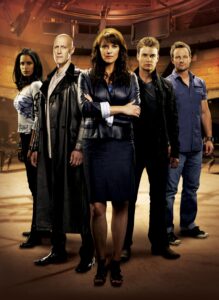I have somewhat of a personal vendetta against time travel. It’s a tricky endeavor. You must familiarize yourself with the many rules and paradoxes the story’s world subscribes to. All before incorporating it into your writing, lest you get lost in the madness.
Take the season four premiere of Sanctuary for an example. In this particular world, time travel seems to subscribe to the Butterfly of Doom concept. I won’t go into too much detail about the episode’s plot itself, but for those who haven’t yet caught up: SPOILERS!
“Sanctuary” Primer
Helen Magnus and a group of her closest companions were each gifted with special abilities. Among those gifts is longevity of life. So, while they’re originally from 19th-century London, they’re alive and well in the 21st century.
 At the end of season three, Magnus follows the seasonal arc’s antagonist through a time portal. This lands the 160-year-old doctor back in 19th-century London. Cue the dramatic music, and the end of the season.
At the end of season three, Magnus follows the seasonal arc’s antagonist through a time portal. This lands the 160-year-old doctor back in 19th-century London. Cue the dramatic music, and the end of the season.
At the start of season four, Magnus must save her original time line from being changed forever. Which means successfully stopping the antagonist’s evil-genius plan. And avoiding any and all contact with 19-century folk that will “compromise history as we know it.”
Constant Battle With Time Travel
But, hang on… Magnus and the antagonist have already disrupted history as we know it. They returned to the past! And this is why I have major issues with time travel.
Our Magnus makes contact with an old friend. She’s reminded how vital it is not to bump into anyone, nor reveal any knowledge she has of the “past”–once more her present.
And yet the mere act of travelling back in time is enough to alter history. Even if done with the full intent of not “getting caught.” Theoretically, if a character is successful in avoiding contact with anyone s/he knows, nothing changes. The character wins, history remains the same.
But we must also consider the minor people and events in history as we know it. These are the tiny ripples that stories often overlook in regards to time travel.
The Ripple Effect
I once had a writing prompt about strangers passing through our lives. The prompt’s focus was the impact that small encounters have on the rest of our lives.
I based my piece off of a lesson from my job at a small-town amusement park. A story from a family who wrote in about their last experience at the park. In short, the family came and had a wonderful day with their aunt, a woman they didn’t often get to see. Upon their leaving, a park employee offered to capture a photo of the family with their aunt.
The family learned shortly thereafter that their aunt had cancer. The photo is the last one they have together.
The Bigger Picture
My point, going back to time travel, is that while the characters believe they’re staying in the shadows, they don’t consider the ripple effects. They avoid any major interaction with their own lives, and the people they know. But they disregard the smaller, potentially more dangerous ripples.
 Suppose your character’s lingering presence in the shadows deters a killer from using that route to track his next victim. The victim now lives, creating a new history where they in turn change the lives of everyone now connected to their past and present. Someone with whom many never would have met if the past hadn’t been tampered with.
Suppose your character’s lingering presence in the shadows deters a killer from using that route to track his next victim. The victim now lives, creating a new history where they in turn change the lives of everyone now connected to their past and present. Someone with whom many never would have met if the past hadn’t been tampered with.
Magnus starts her journey lying in rubble in the streets. People stop to see if she’s all right, delaying their own travels. Someone might be late for an interview, losing a job they originally won, etc.
The ripples are never-ending, and ever-widening. Whoops?